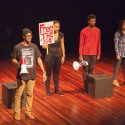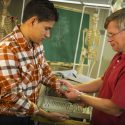‘Cultural activist’ brings spoken word to campus
Willie Ney is living proof of the benefits of a multicultural education — an education that includes African-American, African and Central-American sensibilities. Ney’s exposure to unfamiliar people, places, languages and customs ignited a passion for helping to tell the stories of those rarely listened to.

Willie Ney (center), executive director of the Office of Multicultural Arts Initiatives, mingles backstage with young poets Lyjya Miles (left) and Monica Davidson before the start of the Youth Speaks Wisconsin Teen Spoken Word Finals held Feb. 24 at the Wisconsin Union Theater.
Photo: Jeff Miller
As executive director of the Office of Multicultural Arts Initiatives, he insists, though, that he’s not an academic. “I’m a cultural activist. My job is to serve as a mediator between cultures, for those who are marginalized. I give them a platform to teach about their history and culture. I’m not an authority — I can’t speak about others’ cultures.”
Growing up in Indianapolis, his parents chose to have him attend inner-city public schools that tossed together a diverse student body. “It was natural to interface with everyone. It was mostly African Americans and a minority of whites then. Now, there is a large Latino population in Indianapolis that didn’t exist when I was growing up. It was just a vibe of knowing each other. You learn,” he says. “As they say, ‘Either you can hang or can’t hang.’”
After high school graduation he tested his ability to hang by spending a year living in Kenya on the border of Uganda. He grew frustrated with the organization that set up the program and opted to instead live on his own, making friends, hitchhiking across the country, studying, soaking it all in and learning to respect and appreciate cultures and traditions that are not his own.
Ney’s next adventure and years of living dangerously took him to Nicaragua in the 1980s. “I was there during the years of war and revolution and met political activists from across Central America and the United States,” he says.
He studied, organized sister-state programs and exchange visits, taught English and made connections that would land him in Madison.
It was a stint as road manager for the Soul Vibrations, a reggae band from Nicaragua, that first brought Ney to Madison. The band played the Memorial Union Terrace, Ney met people studying and teaching here and decided this was the place to be. He began working toward a master’s degree in Latin American studies in 1991.
He secured a project assistantship and worked as an undergraduate adviser and outreach coordinator in the Latin American and Iberian Studies Program, which would later become the Latin American, Caribbean and Iberian Studies Program. (LACIS)
Doctoral studies in Latin American history were set aside when Ney became assistant director of LACIS. Ney made good use of his past contacts with grassroots cultural leaders from Central America and the Caribbean and developed some of UW–Madison’s most successful multicultural arts events, such as Sin Fronteras and CineFest.
In 2003, Ney folded CineFest into the Wisconsin Book Festival to introduce Madison to international writers and filmmakers. Life was about to change for Ney.
Excited by the CineFest experience, Ney asked percussionist John Santos, an Arts Institute Interdisciplinary Artist in Residence, how he could reach youth through literature. Santos gave him the names and numbers of leaders in the world of spoken word. “I hadn’t even heard of spoken word,” says Ney. “I am very old school.”
Ney’s innocent question and Santo’s contacts plunged Ney into yet another unfamiliar culture: spoken word and hip hop. Spoken word is performance poetry, often with an urban hip-hop flavor, that promotes messages of social activism, personal experiences and growth. Just as beat writers and rock ‘n’ roll transformed pop culture, hip hop is one of the big ideas of the young generation.
“The youth spoken-word community is loving and cutting-edge. For students, it’s about empowerment and no censorship and feeling comfortable to speak out. That’s what we need to stimulate in our youth,” says Ney.
Ney organized spoken-word presentations at Madison high schools and saw the power of poetry to engage and connect with teens. “We had 2,200 kids in the gym at West High, all electrified and invigorated by poetry. It was all over for me then; it touched a nerve. In the times we live in we need hope, and here it was,” Ney says. “We put together a spoken-word showcase at East High and when it was over, the students spontaneously pulled out their journals and started sharing their work. It was a raw, brilliant, magical moment.
“This is an important multicultural art form that is an opportunity for young people of all backgrounds to get involved by writing. It rejuvenates them and for many students, it plugs them into academics for the first time,” Ney says.
A call then came from James Kass, a UW–Madison alumnus and founder of Youth Speaks, a San Francisco-based organization devoted to spoken-word performance, education and youth development programs. A partnership was forged with UW–Madison, Youth Speaks Wisconsin was born and ultimately found a home in the School of Education through the new Office of Multicultural Arts Initiatives. (OMAI)
Next fall, UW–Madison will welcome its first batch of students to the First Wave Spoken Word and Urban Arts Learning Community. In it, students will live in a dynamic, multicultural university community that will explore all sides of urban arts — the first program of its kind in the country. The students will take courses together, participate in internships and service-learning programs, and learn all aspects of performance arts, from performing and writing to organizing and marketing an event. Film, music, dance and intellectual property issues will all be part of the journey. Chris Walker, guest lecturer in the Dance Program, will serve as artistic director of First Wave.
It’s no coincidence that many of the First Wave students are veterans of Brave New Voices, an international spoken-word competition organized by Youth Speaks. Part of the First Wave experience will be to mentor high school poets. Ney says 29 students applied for the 15 available spots. “Without any doubt, we’ll have 200 applications next year,” Ney predicts. “We’re still in the beginning phase, but we are miles ahead of other campuses.”
According to Ney, UW–Madison is in the center of the institutionalization of hip hop in higher education. The current Line Breaks series is drawing standing-room crowds. And the fact that UW–Madison was able to bring spoken-word star Marc Bamuthi Joseph to campus for the Arts Institute Interdisciplinary Arts Residency Program is one testament to Ney’s assertion, as is First Wave’s recruiting success.
Ney hopes his efforts with spoken word and hip hop will help students succeed as well as helping the university address an on-going challenge. “We have a diversity problem on campus. Through the youth spoken-word movement, we have access to the crème de la crème of student leaders and students of color. UW–Madison is becoming known as the epicenter of spoken word and hip-hop culture in higher education. Many of these students would never have considered enrolling at Madison without First Wave.”
Ney’s cultural activism doesn’t stop there. UW–Madison will host the second annual Spoken Word and Hip Hop Teacher’s Institute this June. Teachers will once again learn how to use hip hop and multicultural arts in their classrooms to engage students. This year, OMAI has teamed with the National Hip-Hop Association and Urban Word NYC to improve on last year’s success.
“It’s vital to integrate new curriculum to make classrooms relevant; the gulf is so wide. But when the student’s narrative becomes part of the class and we allow a kid’s story to be told, they realize their experience is not so different from the history they are studying,” says Ney.
Tags: arts, diversity, learning, spoken word



